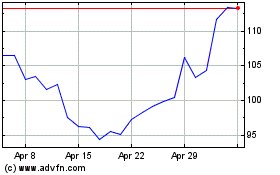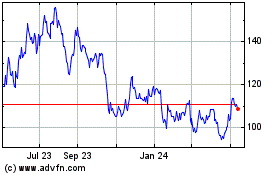Baidu To Test Driverless Cars in U.S.
March 16 2016 - 5:30PM
Dow Jones News
Baidu Inc. will soon start testing autonomous cars in the U.S.,
part of the Chinese tech giant's effort to introduce a commercially
viable model by 2018.
The move, disclosed by Baidu's chief scientist Andrew Ng in an
interview late Tuesday, is a significant step for the company,
which is trying to get ahead in the race to build autonomous cars
and is now calling on the resources of its Silicon Valley tech
center to advance the effort. At the same time, Baidu is advocating
for better coordination with the U.S. government, which the company
says is necessary to get self-driving cars on the road.
Central to the push is Mr. Ng, an artificial-intelligence
scientist who conducted groundbreaking research at Stanford
University and at Alphabet Inc.'s Google. He's also a co-founder of
online-learning company Coursera Inc.
Late last year, Beijing-based Baidu became the latest technology
company to publicize its intention to develop self-driving cars. As
cars increasingly come to resemble robots, nontraditional car
makers are gaining a wider berth into the automotive industry.
Mr. Ng's lab at Stanford, where he remains an assistant
professor, developed the open-source "robot operating system," or
ROS, which is used world-wide.
Baidu, a 16-year-old search-engine company, is often called the
"Google of China." Hired by Baidu in 2014, Mr. Ng leads a growing
office of 160 in Sunnyvale, Calif., where many employees are
dedicated to developing a self-driving car.
Ahead of Tuesday's hearing by the U.S. Senate Commerce Committee
on the regulatory obstacles to autonomous vehicles, Mr. Ng released
testimony calling for governments to make small changes in
infrastructure to accommodate robot cars.
Among those who testified at the hearing were representatives
from Google, General Motors Co. and Delphi Automotive PLC and Duke
University researcher Missy Louise Cummings. Mr. Ng didn't
attend.
Mr. Ng recommended the development of mobile applications to
facilitate communication with driverless vehicles. Some
applications could be used by construction workers, who could send
a signal to computer-driven cars to tell them how to get around
unexpected road closures. Others could allow law-enforcement
authorities to communicate with these vehicles when they are
directing traffic.
Today, fully autonomous vehicles like Google's RX450h can handle
a wide range of situations, but they still can't understand a
police officer yelling through a bullhorn or process nonverbal cues
from other drivers. While these so-called corner cases might seem
rare, they in fact occur regularly.
"The (artificial intelligence) is good enough where the changes
to infrastructure are modest," Mr. Ng said. "Maybe in the distant
future, we could make it drive like a human driver, but not in two
years."
Baidu's aim is to roll out self-driving shuttles running a
standard loop in a limited area in China by the end of 2018. A
well-trod route would limit the potential for the unexpected to
occur. The routes would be expanded gradually as the systems
learned. Baidu is using modified BMW 3-series sedans for its tests
and already has commitments with several Chinese auto makers to
deploy its first autonomous vehicles, Mr. Ng said.
Baidu hasn't decided whether its first autonomous vehicle will
have a steering wheel, Mr. Ng added.
Write to Mike Ramsey at michael.ramsey@wsj.com
(END) Dow Jones Newswires
March 16, 2016 17:15 ET (21:15 GMT)
Copyright (c) 2016 Dow Jones & Company, Inc.
Baidu (NASDAQ:BIDU)
Historical Stock Chart
From Mar 2024 to Apr 2024

Baidu (NASDAQ:BIDU)
Historical Stock Chart
From Apr 2023 to Apr 2024
